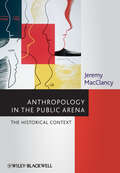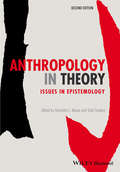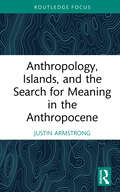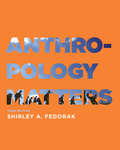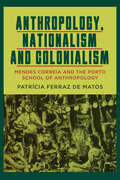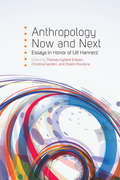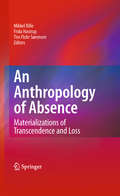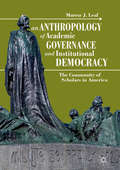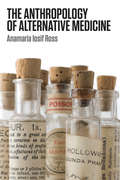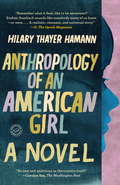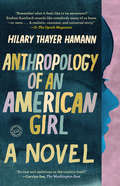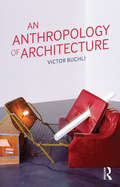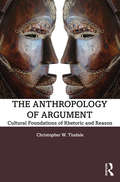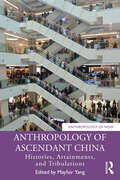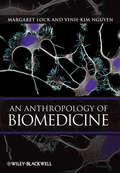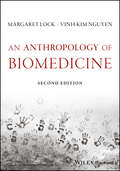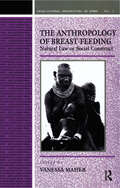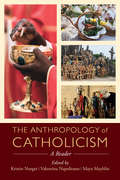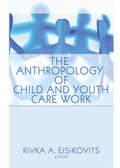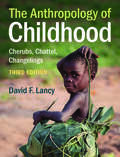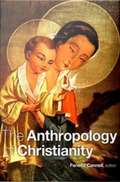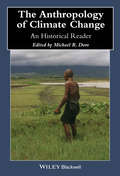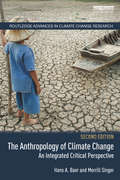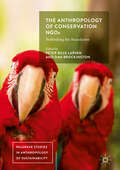- Table View
- List View
Anthropology in the Public Arena
by Jeremy MacclancyThis articulate and authoritative survey of both the popular and academic trends in anthropology demonstrates the broad relevance of anthropological knowledge and argues for a more inclusive conception of the discipline that engages the public imagination.Demonstrates the evolving social contexts of British anthropological theory and practice from the mid-19th centuryHighlights the importance of popular anthropology in forming and sustaining the professional disciplineExplores the past and present cross-fertilization of anthropologists, scientists and prominent literary figuresAssesses the pioneering efforts online to advance the role of anthropology in public debates Appeals to a broader readership interested in cultural and intellectual history
Anthropology in Theory: Issues in Epistemology
by Henrietta L. Moore Todd SandersThis second edition of the widely praised Anthropology in Theory: Issues in Epistemology, features a variety of updates, revisions, and new readings in its comprehensive presentation of issues in the history of anthropological theory and epistemology over the past century. Provides a comprehensive selection of 60 readings and an insightful overview of the evolution of anthropological theory Revised and updated to reflect an on-going strength and diversity of the discipline in recent years, with new readings pointing to innovative directions in the development of anthropological research Identifies crucial concepts that reflect the practice of engaging with theory, particular ways of thinking, analyzing and reflecting that are unique to anthropology Includes excerpts of seminal anthropological works, key classic and contemporary debates in the discipline, and cutting-edge new theorizing Reveals broader debates in the social sciences, including the relationship between society and culture; language and cultural meanings; structure and agency; identities and technologies; subjectivities and trans-locality; and meta-theory, ontology and epistemology
Anthropology, Islands, and the Search for Meaning in the Anthropocene (Ocean and Island Studies)
by Justin ArmstrongPart ethnography, part memoir, and part critical reflection on the Anthropocene, this book examines the ways that islands form and inform human experiences of the everyday and the extraordinary. Utilizing carefully considered anthropological perspectives drawn from over a decade of anthropological fieldwork, the author employs islands as a complex set of lenses to examine the ways that we are intimately connected, separated, and divided from ourselves, one another, and the planet. Moving across time, place and disciplinary boundaries, this book traces a narrative route from the remote islands of Micronesia to the subarctic expanses of northern Iceland, all in service of gaining a deeper understanding of the cultural resonance of islands. This book offers the reader a type of ideological travel guide, one that exchanges restaurant reviews and hotel recommendations for pathways of reflection and new modes of seeing and being in the world. It will be of interest to scholars in the social sciences and humanities, and readers from human geography, cultural studies, sociology, philosophy and American studies.
Anthropology Matters, Third Edition
by Shirley A. FedorakThe third edition of this bestselling book introduces readers to anthropology, and the world around it, by connecting important concepts to current global issues. A question-based approach encourages readers to understand specific issues in a broader cross-cultural context while building an appreciation for anthropology’s role in developing global citizenship. This edition has been updated and revised throughout, including discussion of technology, design anthropology, and the effects of social media on cultural change. As well, two new chapters, one on global responsibility for refugees, and the other on human trafficking as a form of modern-day slavery, make the text particularly relevant.
Anthropology, Nationalism and Colonialism: Mendes Correia and the Porto School of Anthropology
by Patrícia Ferraz de MatosA major contribution to the history of European anthropology, this book highlights the Porto School of Anthropology and analyses the work of its main mentor, Mendes Correia (1888-1960). It goes beyond a Portuguese focus to present a wider comparative analysis in which the colonial empire, knowledge of origins, ethnic identity and cultural practices all receive special attention. The analysis takes into account the fact that nationalism, as associated with an ethno-racial paradigm, decisively influenced discourse and scientific and political practices.
Anthropology Now and Next: Essays in Honor of Ulf Hannerz
by Thomas Hylland Eriksen, Christina Garsten, and Shalini RanderiaThe scholarship of Ulf Hannerz is characterized by its extraordinary breadth and visionary nature. He has contributed to the understanding of urban life and transnational networks, and the role of media, paradoxes of identity and new forms of community, suggesting to see culture in terms of flows rather than as bounded entities. Contributions honor Hannerz’ legacy by addressing theoretical, epistemological, ethical and methodological challenges facing anthropological inquiry on topics from cultural diversity policies in Europe to transnational networks in Yemen, and from pottery and literature to multinational corporations.
An Anthropology of Absence: Materializations of Transcendence and Loss
by Frida Hastrup Mikkel Bille Tim Flohr SoerensenIn studying material culture, anthropologists and archaeologists use meaningful physical objects from a culture to help understand the less tangible aspects of that culture, such as societal structure, rituals, and values. What happens when these objects are destroyed, by war, natural disaster, or other historical events? Through detailed explanations of eleven international case studies, the contributions reveal that the absence of objects can be just as telling as their presence, while the objects created to memorialize a loss also have important cultural implications. Covering everything from organ donation, to funerary rituals, to prisoners of war, The Archaeology of Absence is written at an important intersection of archaeological and anthropological study. Divided into three sections, this volume uses the "presence" of absence to compare cultural perceptions of: material qualities and created memory, the mind/body connection, temporality, and death. This rich text provides a strong theoretical framework for anthropologists and archaeologists studying material culture.
An Anthropology of Academic Governance and Institutional Democracy: The Community of Scholars in America
by Murray J. LeafThis anthropological study of university governance organizations has four main purposes. It aims to describe the principles of effective faculty governance organizations and shared governance; to help mobilize opposition to a large and extremely well-funded system of political attacks aimed at destroying faculty governance organizations; to demonstrate the value of the theory of human social organizations; and to enable universities to become more effective in generating the intellectual advances we must make in order to solve the current global crisis of sustainability and political instability. Political democracy depends on an educated public, and academic democracy is integral to producing such knowledge.
The Anthropology of Alternative Medicine
by Anamaria Iosif RossAlternative medicine is not a fashionable new trend but an established cultural strategy, as well as a dynamic feature of mainstream contemporary medicine, in which elements of folk traditions are often blended with western scientific approaches.The Anthropology of Alternative Medicine is a concise yet wide-ranging exploration of non-biomedical healing. The book addresses a broad range of practices including: substance, energy and information flows (e.g. helminthic therapy); spirit, consciousness and trance (e.g. shamanism); body, movement and the senses (e.g. reiki and aromatherapy); as well as classical medical traditions as complements or alternatives to Western biomedicine (e.g. Ayurveda). Exploring the cultural underpinnings of contemporary healing methods, while assessing current ideas, topics and resources for further study, this book will be invaluable to undergraduate and graduate students in anthropology, sociology, psychology, and health related professions such as nursing, physical and occupational therapy, and biomedicine.
Anthropology of an American Girl: A Novel
by Hilary Thayer HamannThis is what it's like to be a high-school-age girl. To forsake the boyfriend you once adored. To meet the love of your life, who just happens to be your teacher. To discover for the first time the power of your body and mind. This is what it's like to be a college-age woman. To live through heartbreak. To suffer the consequences of your choices. To depend on others for survival but to have no one to trust but yourself. This is Anthropology of an American Girl. A literary sensation, this extraordinarily candid novel about the experience of growing up female in America will strike a nerve in readers of all ages. BONUS: This edition contains an Anthropology of an American Girl discussion guide.
Anthropology of an American Girl
by Hilary Thayer HamannFalling in love, maintaining fragile family relationships and growing to understand the incremental effect of every experience, Hilary Thayer Hamann's coming-of-age novel is a depiction of sexual and intellectual awakening against the backdrop of East Hampton in the 1970s and moneyed, high-pressured Manhattan in the 1980s.As Evie Auerbach surrenders to the dazzling emotional highs of love and the crippling loneliness of heartbreak, she strives to reconcile her identity with the constraints that all relationships inherently place on us. Though she stumbles and strains against social conventions, Evie remains a strong yet sensitive observer of the world around her, often finding beauty and meaning in unexpected places.More than just a love story, Anthropology of an American Girl is an extraordinary piece of writing, original in its vision and thrilling in its execution.
An Anthropology of Architecture
by Victor BuchliEver since anthropology has existed as a discipline, anthropologists have thought about architectural forms. This book provides the first overview of how anthropologists have studied architecture and the extraordinarily rich thought and data this has produced.With a focus on domestic space - that intimate context in which anthropologists traditionally work - the book explains how anthropologists think about public and private boundaries, gender, sex and the body, the materiality of architectural forms and materials, building technologies and architectural representations. Each chapter uses a broad range of case studies from around the world to examine from within anthropology what architecture 'does' - how it makes people and shapes, sustains and unravels social relations.An Anthropology of Architecture is key reading for students of anthropology, material culture, geography, sociology, architectural theory, design and city planning.
The Anthropology of Argument: Cultural Foundations of Rhetoric and Reason
by Christopher W. TindaleThis innovative text reinvigorates argumentation studies by exploring the experience of argument across cultures, introducing an anthropological perspective into the domains of rhetoric, communication, and philosophy. The Anthropology of Argument fills an important gap in contemporary argumentation theory by shifting the focus away from the purely propositional element of arguments and onto how they emerge from the experiences of peoples with diverse backgrounds, demonstrating how argumentation can be understood as a means of expression and a gathering place of ideas and styles. Confronting the limitations of the Western tradition of logic and searching out the argumentative roles of place, orality, myth, narrative, and audience, it examines the nature of multi-modal argumentation. Tindale analyzes the impacts of colonialism on the field and addresses both optimistic and cynical assessments of contextual differences. The results have implications for our understanding of contemporary argumentative discourse in areas marked by deep disagreement, like politics, law, and social policy. The book will interest scholars and upper-level students in communication, philosophy, argumentation theory, anthropology, rhetoric, linguistics, and cultural studies.
Anthropology of Ascendant China: Histories, Attainments, and Tribulations (Anthropology of Now)
by Mayfair YangThis volume represents the latest research in cultural anthropology on an ascendant and globalizing China, covering the many different dimensions of China’s ascendancy both within China itself and beyond.It focuses not only on the real and perceived successes of China in the past four decades, but also on the difficulties, tensions, and dangers that have emerged as a result of rapid economic development: class polarization, state expansion, psychological distress, and environmental degradation. Including contributions by some of the most well-known cultural anthropologists of China, as well as rising innovative younger scholars, this book documents and analyzes China’s multifaceted transformations in the modern era—both within Chinese society and in Chinese relations with the outside world. It features the unique perspective of anthropology, with its on-the-ground deep cultural immersion through long-term fieldwork, coupled with a macrolevel global perspective, a strong historical perspective, and theoretically engaged analyses to present a balanced account of China’s ascendancy.Anthropology of Ascendant China: Histories, Attainments, and Tribulations is suitable for students and scholars in Anthropology, Sociology, History, Political Science, and East Asian Studies, as well as those working on contemporary Chinese society and culture more broadly.
An Anthropology of Biomedicine
by Margaret Lock Vinh-Kim NguyenAn Anthropology of Biomedicine is an exciting new introduction to biomedicine and its global implications. Focusing on the ways in which the application of biomedical technologies bring about radical changes to societies at large, cultural anthropologist Margaret Lock and her co-author physician and medical anthropologist Vinh-Kim Nguyen develop and integrate the thesis that the human body in health and illness is the elusive product of nature and culture that refuses to be pinned down. Introduces biomedicine from an anthropological perspective, exploring the entanglement of material bodies with history, environment, culture, and politics Develops and integrates an original theory: that the human body in health and illness is not an ontological given but a moveable, malleable entity Makes extensive use of historical and contemporary ethnographic materials around the globe to illustrate the importance of this methodological approach Integrates key new research data with more classical material, covering the management of epidemics, famines, fertility and birth, by military doctors from colonial times on Uses numerous case studies to illustrate concepts such as the global commodification of human bodies and body parts, modern forms of population, and the extension of biomedical technologies into domestic and intimate domains Winner of the 2010 Prose Award for Archaeology and Anthropology
An Anthropology of Biomedicine
by Margaret Lock Vinh-Kim NguyenIn this fully revised and updated second edition of An Anthropology of Biomedicine, authors Lock and Nguyen introduce biomedicine from an anthropological perspective, exploring the entanglement of material bodies with history, environment, culture, and politics. Drawing on historical and ethnographic work, the book critiques the assumption made by the biological sciences of a universal human body that can be uniformly standardized. It focuses on the ways in which the application of biomedical technologies brings about radical changes to societies at large based on socioeconomic inequalities and ethical disputes, and develops and integrates the theory that the human body in health and illness is not an ontological given but a moveable, malleable entity. This second edition includes new chapters on: microbiology and the microbiome; global health; and, the self as a socio-technical system. In addition, all chapters have been comprehensively revised to take account of developments from within this fast-paced field, in the intervening years between publications. References and figures have also been updated throughout. This highly-regarded and award-winning textbook (Winner of the 2010 Prose Award for Archaeology and Anthropology) retains the character and features of the previous edition. Its coverage remains broad, including discussion of: biomedical technologies in practice; anthropologies of medicine; biology and human experiments; infertility and assisted reproduction; genomics, epigenomics, and uncertain futures; and molecularizing racial difference, ensuring it remains the essential text for students of anthropology, medical anthropology as well as public and global health.
Anthropology of Breast-Feeding: Natural Law or Social Construct (Cross-Cultural Perspectives on Women)
by Vanessa MaherOn the whole, the debates surrounding the issues of breast-feeding - often reflecting ethnographic and ill-informed medical and demographic approaches - have failed to treat the deeper issues. The significance of breast-feeding reaches far beyond its biological function; in fact, the authors of this volume argue, there is nothing `natural' about breast-feeding itself. On the contrary, attitudes and practices are socially determined, and breast-feeding has to be seen as an essential element in the cultural construction of sexuality.This volume offers an `ethnography' of breast-feeding by examining cultural norms and practices in a number of European and non-European societies, thus presenting valuable and often astonishing empirical material that is not otherwise readily available. The highly original focus of this volume therefore throws new light on gender and on social relationships in general.
The Anthropology of Catholicism: A Reader
by Kristin NorgetAimed at a wide audience of readers, The Anthropology of Catholicism is the first companion guide to this burgeoning field within the anthropology of Christianity. Bringing to light Catholicism’s long but comparatively ignored presence within the discipline of anthropology, the book introduces readers to key studies in the field, as well as to current analyses on the present and possible futures of Catholicism globally. This reader provides both ethnographic material and theoretical reflections on Catholicism around the world, demonstrating how a revised anthropology of Catholicism can generate new insights and analytical frameworks that will impact anthropology as well as other disciplines.
The Anthropology of Child and Youth Care Work
by Jerome BekerThe Anthropology of Child and Youth Care Work presents and illustrates an anthropological model of child and youth care work and explores the associated benefits of such an approach. Author Rivka A. Eisikovits’model enhances workers’on-the-job effectiveness with clients and co-workers and improves intra- and inter-organizational communication with other human service providers. This book prepares child and youth care providers, educators, researchers, administrators, consultants, supervisors, and organizers to become change-sensitive, process-oriented observers, analysts, and co-designers of the systems within which they function and those with which they interact, such as families, communities, and referral agencies. The model presented in The Anthropology of Child and Youth Care Work offers readers an organic continuum between everyday work experience and conceptual practice, organizing such haphazard events into a systemized body of knowledge. Although providing specific skills, it is more than a technology--it is a humanistic worldview from which a humanistic practice philosophy can be derived. Specific points of this philosophy that child and youth care professionals learn about include: the cultural learning theory ethnographic inquiry and description staff-client relations the sick-role trap microcultural events in residential settings the relationship between treatment and education subsystems a heuristic approach to service delivery family cultural ethnography for cultural sensitizationEisikovits’anthropologic perspective broadens the horizons of child and youth care work and equips practitioners to transcend narrowly drawn organizational boundaries. By presenting caregivers as cultural translators between their clients and various decision-making forums, The Anthropology of Child and Youth Care Work prepares them to face the challenges of a dynamic emergent profession and helps them perform successfully in a rapidly changing social context that requires constant assessment of needs and evaluation of performance.
The Anthropology of Childhood: Cherubs, Chattel, Changelings
by David F. LancyHow are children raised in different cultures? What is the role of children in society? How are families and communities structured around them? Now in its third edition, this deeply engaging book delves into these questions by reviewing and cataloging the findings of over 100 years of anthropological scholarship dealing with childhood and adolescence. It is organized developmentally, moving from infancy through to adolescence and early adulthood, and enriched with anecdotes from ethnography and the daily media, to paint a nuanced and credible picture of childhood in different cultures, past and present. This new edition has been expanded and updated with over 350 new sources, and introduces a number of new topics, including how children learn from the environment, middle childhood, and how culture is 'transmitted' between generations. It remains the essential book to read to understand what it means to be a child in our complex, ever-changing world.
The Anthropology of Childhood
by David F. LancyThe Anthropology of Learning in Childhood offers a portrait of childhood across time, culture, species, and environment. It demonstrates that anthropologists studying childhood can offer a description and theoretically sophisticated account of childrenÆs learning and its role in their development, socialization, and enculturation. Further, it reveals the particular contribution that childrenÆs learning makes to the construction of society and culture as well as the role that culture-acquiring children play in human evolution. Contributors write from various perspectives, including archaeology, primatology, biological and cultural anthropology, and cross-cultural psychology. Book jacket.
The Anthropology of Christianity
by Fenella CannellThis collection provides vivid ethnographic explorations of particular, local Christianities as they are experienced by different groups around the world. At the same time, the contributors, all anthropologists, rethink the vexed relationship between anthropology and Christianity. As Fenella Cannell contends in her powerful introduction, Christianity is the critical "repressed" of anthropology. To a great extent, anthropology first defined itself as a rational, empirically based enterprise quite different from theology. The theology it repudiated was, for the most part, Christian. Cannell asserts that anthropological theory carries within it ideas profoundly shaped by this rejection. Because of this, anthropology has been less successful in considering Christianity as an ethnographic object than it has in considering other religions. This collection is designed to advance a more subtle and less self-limiting anthropological study of Christianity. The contributors examine the contours of Christianity among diverse groups: Catholics in India, the Philippines, and Bolivia, and Seventh-Day Adventists in Madagascar; the Swedish branch of Word of Life, a charismatic church based in the United States; and Protestants in Amazonia, Melanesia, and Indonesia. Highlighting the wide variation in what it means to be Christian, the contributors reveal vastly different understandings and valuations of conversion, orthodoxy, Scripture, the inspired word, ritual, gifts, and the concept of heaven. In the process they bring to light how local Christian practices and beliefs are affected by encounters with colonialism and modernity, by the opposition between Catholicism and Protestantism, and by the proximity of other religions and belief systems. Together the contributors show that it not sufficient for anthropologists to assume that they know in advance what the Christian experience is; each local variation must be encountered on its own terms. Contributors. Cecilia Busby, Fenella Cannell, Simon Coleman, Peter Gow, Olivia Harris, Webb Keane, Eva Keller, David Mosse, Danilyn Rutherford, Christina Toren, Harvey Whitehouse
The Anthropology of Climate Change: An Historical Reader (Wiley Blackwell Anthologies in Social and Cultural Anthropology)
by Michael R. DoveThis timely anthology brings together for the first time the most important ancient, medieval, Enlightenment, and modern scholarship for a complete anthropological evaluation of the relationship between culture and climate change. Brings together for the first time the most important classical works and contemporary scholarship for a complete historical anthropological evaluation of the relationship between culture and climate change Covers the historic and prehistoric records of human impact from and response to prior periods of climate change, including the impact and response to climate change at the local level Discusses the impact on global debates about climate change from North-South post-colonial histories and the social dimensions of the science of climate change. Includes coverage of topics such as environmental determinism, climatic events as social catalysts, climatic disasters and societal collapse, and ethno-meteorology An ideal text for courses in climate change, human/cultural ecology, environmental anthropology and archaeology, disaster studies, environmental sciences, science and technology studies, history of science, and conservation and development studies
The Anthropology of Climate Change: An Integrated Critical Perspective (Routledge Advances in Climate Change Research)
by Merrill Singer Hans A. BaerIn addressing the urgent questions raised by climate change, this book provides a comprehensive overview of the anthropology of climate change, guided by a critical political ecological framework. It examines the emergence and slow maturation of the anthropology of climate change, reviews the historic foundations for this work in the archaeology of climate change, and presents three alternative contemporary theoretical perspectives in the anthropology of climate change. This second edition is fully updated to include the most recent literature published since the first edition in 2014. It also examines a number of new topics, including an analysis of the 2014 American Anthropological Association’s Global Climate Change Task Force report, a new case study on responses to climate change in developed societies, and reference to the stance of the Trump administration on climate change. Not only does this book provide a valuable overview of the field and the key literature, but it also gives researchers and students in Environmental Anthropology, Climate Change, Human Geography, Sociology, and Political Science a novel framework for understanding climate change that emphasizes human socioecological interactions.
The Anthropology of Conservation NGOs
by Dan Brockington Peter Bille LarsenThis book explores how NGOs have been influential in shaping global biodiversity, conservation policy, and practice. It encapsulates a growing body of literature that has questioned the mandates, roles, and effectiveness of these organizations-and the critique of these critics. This volume seeks to nurture an open conversation about contemporary NGO practices through analysis and engagement.
